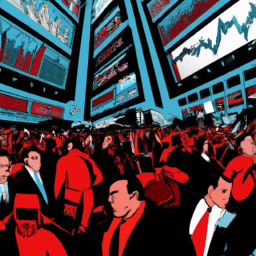Greenlight Capital was forced to shift its strategy as the growth of passive investing and algorithmic trading transformed markets, according to David Einhorn, the firm's founder. In a recent interview on the Masters in Business podcast, Einhorn expressed his concerns, stating that "the value industry has gotten completely annihilated." He added that the rise of passive and quant investing has resulted in fewer traders actively analyzing individual stocks, leading to a market that he believes is "fundamentally broken."
Einhorn's criticism of passive and quant investing is not unfounded. These investment strategies rely on algorithms and computer models to make investment decisions, often based on quantitative factors, rather than human judgment. While they have gained popularity due to their low costs and potential for diversification, critics argue that they can exacerbate market volatility and distort stock prices.
China's recent efforts to stabilize its stock market, which has experienced a $7 trillion rout, are reminiscent of similar actions taken by Beijing in 2015. Back then, the Chinese government took drastic measures to halt the market decline, including restricting trading, injecting liquidity, and banning short-selling. The current situation has raised concerns about the health of China's financial system and its ability to manage market volatility effectively.
In Hong Kong, Chinese equities faced a third consecutive day of slumping prices. The decline comes amid public holidays in many markets in the region, limiting trading activity. The ongoing tensions between the US and China, including trade disputes and geopolitical issues, have contributed to the volatility in Chinese equities.
US regulators are tightening their grip on hedge funds, requiring them to share more confidential information about their investment strategies. The move aims to enhance transparency and provide regulators with a better understanding of the risks posed by hedge funds. This increased scrutiny may impact the operations of hedge funds and potentially influence market dynamics.
Wall Street experienced a struggle to gain traction, with the bond market digesting another significant sale of Treasuries, while stocks hovered near record highs. Investors are closely monitoring the bond market, as the Federal Reserve's tapering plans and inflation concerns continue to drive market sentiment.
Pressure is mounting on the onshore yuan to weaken beyond an unofficial line in the sand for policymakers. This development has caught the attention of traders, who are closely monitoring the currency's movements for potential investment opportunities. Any significant depreciation of the yuan could have ripple effects on global markets, particularly in terms of trade and currency exchange rates.
SoftBank Group Corp. shares surged to their highest level in almost three years, fueled by continued investor optimism. The Japanese conglomerate has been actively involved in various technology investments, including its Vision Fund, which has backed numerous high-profile startups. SoftBank's performance is closely watched by investors, as it is seen as a bellwether for the broader technology sector.
Chinese investors and their creditors are increasingly putting up "For Sale" signs on real estate holdings worldwide. The need for liquidity and concerns over China's property market have prompted these investors to divest their real estate assets. This trend could have implications for both the global real estate market and the Chinese economy as a whole.
In conclusion, David Einhorn's criticisms of passive and quant investing highlight the challenges faced by traditional value investors in today's markets. The rise of algorithmic trading and passive strategies has transformed market dynamics, leading to concerns about market integrity and volatility. As global markets navigate various geopolitical and economic uncertainties, market participants must carefully evaluate the implications of these evolving trends on investment strategies and overall market stability.
